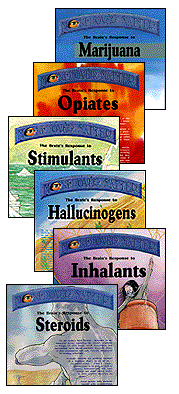NIDA has released a new series of drug abuse education materials called Mind Over Matter. Designed for students in grades five through nine, the series consists of six full-color glossy magazines that unfold into posters. The package also includes a comprehensive teacher's guide. In each magazine, a girl named Sara Bellum - a play on "cerebellum," a section of the brain that helps control coordination - explores the brain's response to a particular drug and introduces key concepts in neuroscience.
The magazines teach students about the adverse effects of marijuana, opiates, stimulants, hallucinogens, inhalants, and steroids. A seventh in the series, which will discuss nicotine, will be available early in 1998. The magazines are designed to excite students about science in general and neuroscience in particular.
The series uses illustrations and cartoons to provide useful information. Some illustrations show Sara Bellum scuba diving in the depths of the brain, watching drug molecules alter nerve cell activity. The cartoons often depict a nerve cell or organ performing abnormally under the influence of drugs. For example, a heart playing drums in a rock band loses its rhythm due to cocaine.
The posters on the reverse side of each magazine can be seen after the magazine is unfolded. Each 18- by 38-inch poster has a quote from a well-known scientist superimposed over a vivid color photograph of a brain image or neuron. For example, on the back side of the opiates magazine and superimposed over a photograph of neurons in the brain is a quote from Jacob Bronowski, the late British mathematician, which reads, "The essence of science: Ask an impertinent question, and you are on the way to a pertinent answer."
Following are the six magazines and their subjects:

The teacher's guide provides detailed information on the brain and how drugs of abuse affect it. It also lists resources and suggests activities to help students remember the principles discussed in the magazines.
Mind Over Matter is a product of NIDA's Science Education Program, which funds programs to interest children in pursuing careers in science and to increase knowledge about drug abuse and addiction among the general public. The six magazine-posters and the teacher's guide are available free from NIDA DrugPubs
- The Brain's Response to Marijuana shows how marijuana affects emotions, memory, judgment, balance, and coordination.
- The Brain's Response to Opiates discusses how opiates such as heroin act on many places in the brain and spinal cord and how addiction and withdrawal affect neurons.
- The Brain's Response to Stimulants demonstrates how cocaine and amphetamines change the way neurons in the brain communicate and disrupt the functioning of the heart and blood vessels.
- The Brain's Response to Hallucinogens explains how hallucinogens such as LSD and PCP affect the senses by disrupting the actions of chemical messengers in the brain.
- The Brain's Response to Inhalants illustrates how inhalants break down the electrical insulation surrounding many of the 's neurons, making it difficult for them to transmit messages.
- The Brain's Response to Steroids describes how anabolic steroids can make people look stronger on the outside and yet cause extensive damage on the inside.
